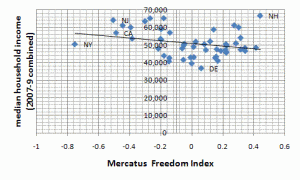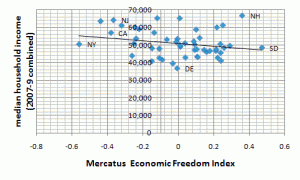- Facebook158
- Threads
- Bluesky
- Total 158
The Mercatus Center, a libertarian outfit, provides rankings of states’ “freedom,” defined as the absence of taxation, spending, and regulation by governments. So if a state spends more on education or requires more years of schooling, its people are considered less free. Writers like de Tocqueville and Mill provide classical liberal accounts in which social norms and families (not just governments) are threats to personal freedom, and mind-broadening experiences like education (even if state-funded and mandatory) can expand freedom.
But the Mercatus Center is entitled to its view, which is state-phobic. They are eager to show that their index of freedom correlates with economic growth. What jumps out at me, instead, is the appearance of some of our most economically dynamic and important states (Massachusetts, California, Hawaii, New Jersey, and New York) at the very bottom of their freedom list.
In fact, I find a not-very-strong but negative correlation between freedom and median household income:
New Hampshire is a Mercatus utopia: high freedom, high wealth. But what about New Jersey: low freedom but rich? Or New York, an outlier on the unfree end of the spectrum, yet with above-average household income?
The graph above uses the whole Freedom Index, including items like drug laws and same-sex marriage that seem fairly remote from economics. Indeed, Mercatus found no correlation between its “personal freedom” subscore and growth. But they also have an economic freedom index that’s all about taxation and regulation. Again, the correlation with wealth is negative–less freedom means higher household income:
My graphs do not by any means prove causation. But I suspect that more than a century of state investment in infrastructure and education is one reason for the high income (but low “freedom”) of New York and Massachusetts, whereas low state investment helps to explain the relative poverty (but high “freedom”) of states like Texas and Oklahoma.


But what is cause and what is effect? Perhaps, in general, as states become wealthier the focus of its populace is to begin to demand more services.
Gene, Good point, and the dynamic you suggest could happen. But I don’t believe it’s the main dynamic in this case, because the heyday of government activism in states like NY, NJ, and MA was 1890-1960. That era left residues both of substantial state intervention AND comparatively high incomes.
Poor people are too stupid to avail themselves of any government help other than spending welfare checks on dope and alcohol.
This analysis is misleading, because it’s not an analysis over time. The income of the freer states has been growing faster than that of the wealthier less-free states, as economic libertarians would expect. The wealthier received a head start in our nation’s history with access to natural resources conducive to profit. Now if they don’t liberalize, there going to be overtaken.
I agree that the analysis is not over time, and that’s essential. But are we sure that the wealthier states had natural resource advantages? Do CT and NJ, for example, have the highest per capita endowments of natural resources in the US? Also, are we sure that the states that are growing fastest are more libertarian?